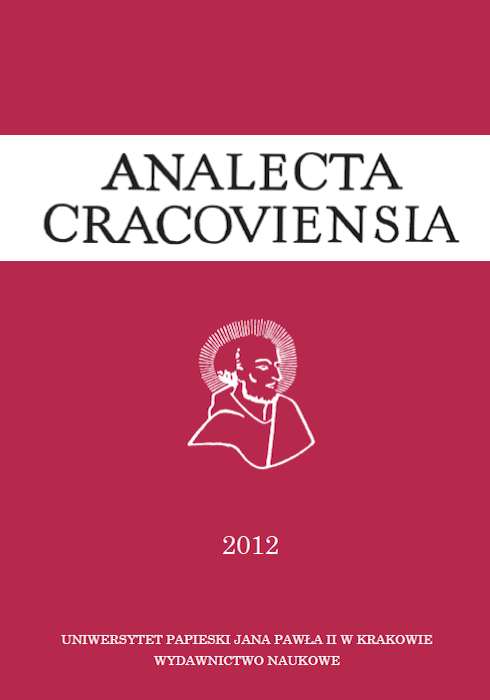The allegorical sense of Gregory the Great’s commentary on the Song of Songs
DOI:
https://doi.org/10.15633/acr.7Słowa kluczowe:
Allegory, Gregory the Great, Song of Songs, senseAbstrakt
Gregory the Great in his Expositio in Canticis Canticorum, created between the years 594 or 595 and 598, ends the patristic tradition of allegorical commentaries on Sg. We are not in the possession of the complete text of Gregory’s commentary, as the text of the Pope’s interpretations finishes at Sg 1 : 8. The text of the commentary as we have it at present shows some signs of a revision made by Gregory I himself and has features characteristic of the original oral version of the text. The comparative study of Origen’s and Gregory’s commentaries shows that Pope Gregory I was familiar with Origen’s homilies and commentary on Sg and used his writings while working on his own text, but only sparingly. Gregory I undoubtedly took from Origen the general approach, some phrases, and at times the way in which exegesis of a certain extract was executed. Gregory discussed the biblical text in accordance with the principles of intellectual, parenetic and pastoral interpretation. The primary interest of the Pope was to extract the spiritual-mystical meaning of the text, and the allegorical interpretation is supposed to help man read the biblical text so that he can love God and follow Him. The allegorical reading of Sg, and actually of the whole Bible as well, should consequently kindle the love of God in man and fill him with thoughts of God. Gregory I recommends a spiritual-ascetic reading of the Bible: the reader is supposed to change his habits for the better, be able to alienate himself ascetically from the surrounding world, and in this way acquire contemplation of Godly matters.
Pobrania
Opublikowane
Numer
Dział
Licencja
Prawa autorskie (c) 2012 Dariusz Kasprzak

Praca jest udostępniana na licencji Creative Commons Attribution-NonCommercial-NoDerivatives 3.0 Unported License.
Obecnie autorzy publikujący w czasopiśmie udzielają jego wydawcy zgody o następującej treści:
- Autor zachowuje autorskie prawa majątkowe do utworu, a jednocześnie udziela wydawcy czasopisma zgody na jego pierwszą publikację w wersji drukowanej i wersji online na licencji Creative Commons Uznanie autorstwa 4.0 Międzynarodowe oraz zgody na wykonywanie opracowań, w tym przekładów.
- Autor ma możliwość udzielania zgody niewyłącznej na opublikowanie utworu w wersji, która ukazała się w czasopiśmie (np. zamieszczenia go w repozytorium instytucjonalnym lub opublikowania w książce), wraz z informacją o jego pierwszej publikacji w czasopiśmie.
- Autor może umieścić swój utwór online (np. w repozytorium instytucjonalnym lub na swojej stronie internetowej) jeszcze przed zgłoszeniem utworu do czasopisma.

